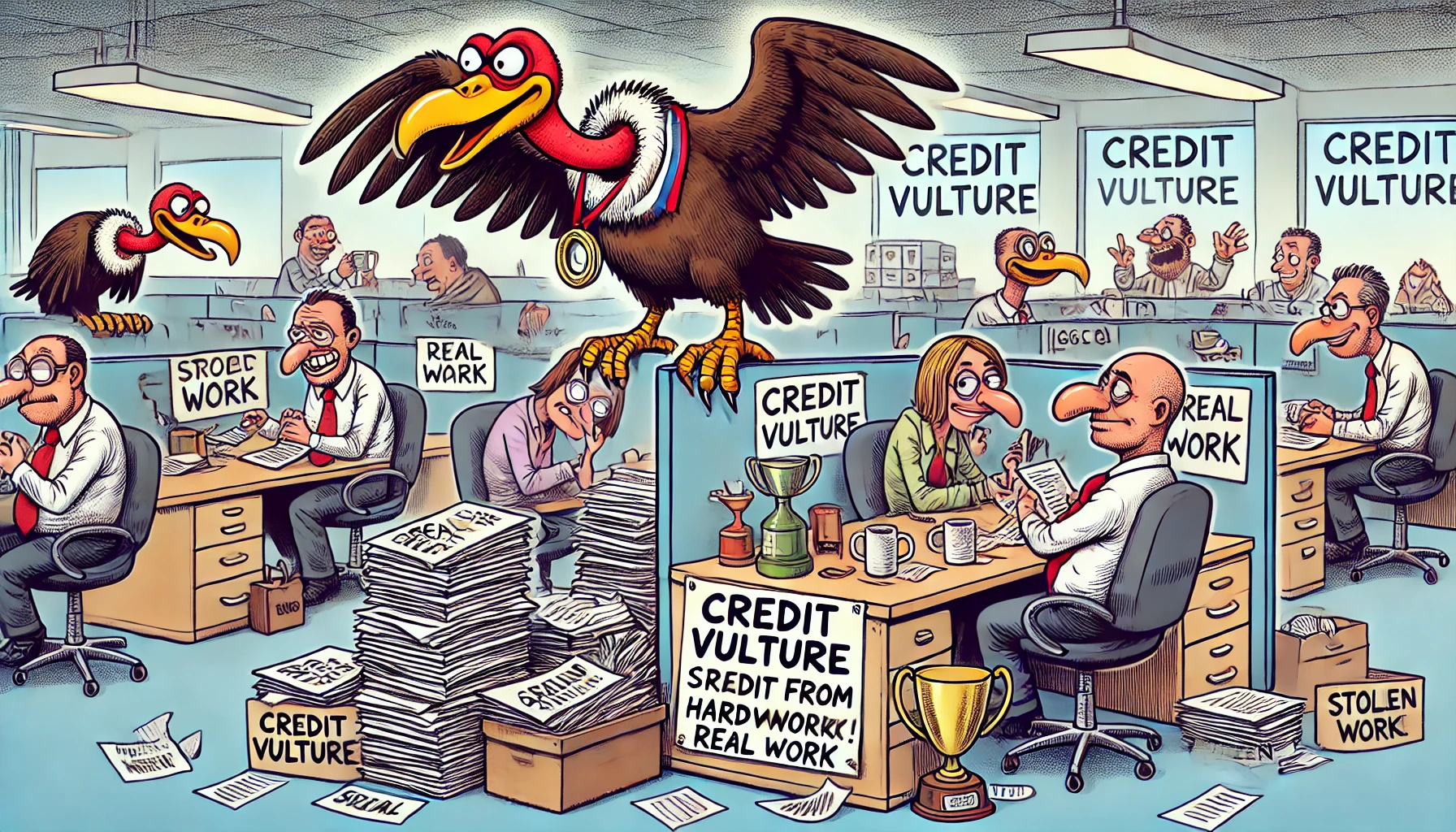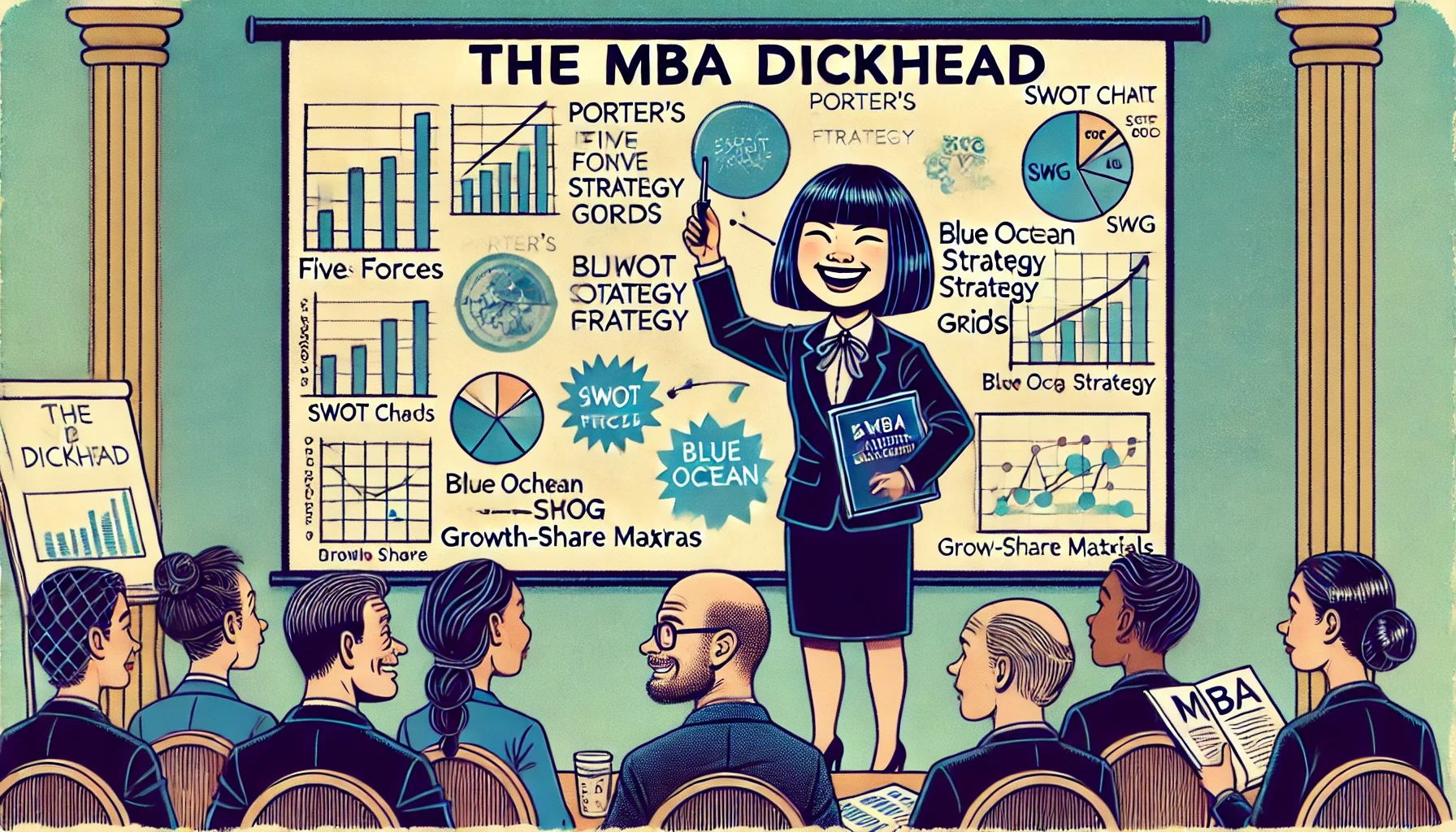Definition: The Ultimate Workplace Opportunist
Meet The Credit Vulture – the ultimate workplace opportunist who swoops in to claim ownership of successes they had little or nothing to do with. This creature miraculously appears at the finish line of projects, eager to bask in the glory of a job well done despite having contributed absolutely nothing of value to the actual work. They are masters at inserting themselves into the narrative to ensure they get recognition without lifting a finger. Think of them as the office peacock – they disappear when there’s real work to be done and reappear only when it’s time to shine and soak up praise. Universally loathed yet strangely successful, the Credit Vulture thrives on other people’s accomplishments, always on the lookout for the next victory to call their own.
Parody Scenario: A Day in the Life of a Credit Vulture
Imagine this: Your team has been grinding for weeks on a high-stakes project. You’ve eaten too many cold pizzas, pulled late nights, and finally sent off a brilliant deliverable. The whole team is geared up for the big review meeting with senior leadership, ready to present the results. Enter the Credit Vulture. Let’s call him Clive. Clive hasn’t shown genuine interest in this project for six months – in fact, you barely remember the last time he contributed anything beyond a nod in a meeting. But the moment he senses praise in the air, he materializes out of nowhere, feathers (er, tie) perfectly in place, just in time for the spotlight.
In the debrief meeting, before anyone else can speak, Clive swoops in with a confident grin: “I’d like to kick things off. Our team has been working tirelessly on this initiative, and I’m proud to report we’ve achieved excellent results.”
As Clive speaks in grand we’s and I’s, you and your teammates exchange flabbergasted glances on mute. Any time you attempt to chime in with actual details, Clive cheerfully cuts you off – “Right, right, let’s move on” – making sure the narrative stays firmly about him. It’s a masterclass in credit theft. By the end of the meeting, the VPs are congratulating Clive for “his” successful project, thanking him for leading the effort so effectively. Clive basks in the praise and delivers a humblebragging finale: “Couldn’t have done it without my team,” he says, as if he was actually part of the team. (That would mean something if he had written even a single line of the report, but we all know he didn’t.) With a satisfied smile, our Credit Vulture leaves the room (or logs off the Zoom) after effectively robbing everyone’s thunder. Meanwhile, the real contributors sit there stunned, wondering what just happened. All in a day’s work for the Credit Vulture!
Why They Exist: How Corporate Culture Breeds Vultures
It’s easy to blame Clive for these shameless antics, but the truth is Credit Vultures flourish because corporate structures let them. Many organizations inadvertently reward style over substance. In environments where perception matters more than reality, the person who talks the loudest or stands in front of the presentation often gets more credit than the people who actually did the legwork. Busy executives can be blind to who’s doing the real work – they see a polished presentation and a confident figure (the Vulture) and assume that person must be responsible for the success. The Credit Vulture understands this leadership blind spot and exploits it masterfully, knowing that visibility often counts more than actual contribution.
There’s also a corporate obsession with “visibility” – being attached to important projects, getting your name in lights (or at least in emails). Credit Vultures operate on the principle that appearing involved is as good as actually being involved. After all, if no one checks the fine print, claiming “I was involved from the beginning” costs them nothing and fools plenty. Meanwhile, a lack of real accountability for results enables them further. If a project succeeds, higher-ups aren’t digging through version control to see who coded what; they’re content with the success and the convenient narrative the Vulture provides. And if a project falters? The Vulture has usually kept their involvement vague enough to slip away unscathed. (In fact, these folks can distance themselves from failure faster than a rat fleeing a sinking ship, making sure any blame doesn’t stick to them.) The corporate system’s focus on outcomes over individual contributions creates the perfect cover for Credit Vultures to swoop in, shine during the good times, and vanish when there’s toil or trouble. As long as companies reward those who “manage up” and create a loud buzz about their work (instead of actually measuring who did the work), the Credit Vulture will survive and thrive in the wilds of the workplace jungle.
How to Spot One: Signature Behaviors of the Credit Vulture
Not sure if that helpful colleague of yours is actually a Credit Vulture in disguise? Here are the telltale signs and signature behaviors to watch out for:
Always at the finish line (never at the start): Somehow, their name is always on the email or announcement celebrating a project’s success – even if nobody remembers them doing any of the work to get there. They magically show up in CC lines, project wiki pages, or final presentations once the heavy lifting is done, just in time to partake in the glory.
Last-minute “advisor” swoop: They tend to pop in during the 11th hour with a drive-by suggestion or a piece of generic advice, then retroactively claim they were involved all along. For example, they’ll drop a vague comment like, “Don’t forget to consider the client’s perspective,” when the project is 99% complete, and later spin that as if they had been guiding the team from the start. (In their mind, they’ve now earned co-author credit on your weeks of work by offering a two-cent tip on deadline day.)
Master of vague jargon: Listen for grand, authoritative-sounding phrases that convey almost zero substance. The Credit Vulture speaks fluent corporate buzzword. They might chime in with something like, “We should ensure alignment with corporate strategy,” which sounds wise and involved but adds no tangible insight. It’s a safe, high-level comment that can’t be wrong – and conveniently, it implies they’re looking at the “big picture” (while others handle the actual details).
Pronoun gymnastics: Pay attention to how they share credit and blame. When talking about successes, they liberally use “we” – as in “we really knocked it out of the park” – to insinuate they were part of the victory. But if there’s a problem or failure, suddenly it’s “you” (or “the team”) that dropped the ball. They expertly include themselves in every win and exclude themselves from any loss. It’s like credit and responsibility are a choose-your-own-adventure story, and they always choose the page where they look good.
Front-and-center for bosses: The Credit Vulture loves the limelight. They are often the first to volunteer to present the team’s work to senior leadership, or to “update” the higher-ups on project status. By controlling the message, they ensure their face and name are the ones associated with the project’s success. They’ll happily be the messenger of good news every time, because they know managers often remember whodelivered the report more than who actually prepared it. (Bonus points if they insist on sending out the summary email to leadership, because that guarantees their name appears at the top of the note—effectively tying themselves to the achievement in writing.)
Social media self-promotion: If all else fails, check their LinkedIn. A Credit Vulture’s LinkedIn profile is basically a shrine of stolen glory. You’ll see posts like “So proud to have led my team in delivering Project X!” complete with celebratory emojis and humblebrag hashtags. Curiously, colleagues recall them doing next to nothing on Project X. Their online persona is “Visionary Leader of Successful Initiatives”; offline, they’re the person who showed up to one meeting and then reappeared at the celebration party. If someone’s feed is full of victorious project posts and you’re scratching your head thinking, “Wait, did they even work on that?”, you might have a Credit Vulture on your hands.
How to Deal With Them: A Humorous Survival Guide
Dealing with a Credit Vulture can be maddening – but fear not, there are ways to protect yourself (and your well-deserved credit) without descending into office warfare. Here’s a tongue-in-cheek survival guide for handling these glory grabbers, all while keeping things diplomatic:
Document and broadcast contributions (keep those receipts): Don’t let the Vulture rewrite history. Keep a clear, public record of who actually did what. For example, after a big milestone, send a summary email to the team andrelevant higher-ups listing each person’s contributions in black and white. (“Project completed: Alice coordinated user testing, Bob analyzed the data, Carol wrote the report,” etc.) By tagging or naming contributors, you create a paper trail that even the craftiest Credit Vulture can’t easily ignore. It’s much harder for Clive to later claim “we” did something when there’s an email from you saying exactly who did it. In short: cover your bases with documentation. If the Vulture tries to swoop in and take credit, you can politely refer back to the documented contributions – receipts, as they say, don’t lie.
Speak up early and often (preempt their swoop): Credit Vultures operate in the void of information, so don’t give them one. Beat them to the punch by being the one who communicates progress to leadership. If you know a project review is coming, offer to present or send the update before they do. When something goes well, inform your boss before the Vulture even catches wind of it. This way, when Clive tries to swoop in with “Let me update you on our success,” the higher-ups can say, “Oh, I already heard all about it from the team.” By seizing control of the narrative, you leave little room for a Credit Vulture to insert themselves. (Think of it as starving the vulture – if you’ve already served up the credit to the rightful owners, there’s nothing left for him to feast on.)
Shine the spotlight on the real heroes: A great way to disarm a Credit Vulture is to generously and publicly give credit to your colleagues before the Vulture can steal it. In meetings, make a point to shout out individuals: “I have to thank Deepa for her insightful analysis here, and Ryan for the hours he put into troubleshooting.” Naming names derails the vulture’s strategy. It forces them to either publicly acknowledge those contributors or risk looking oblivious. (After all, it’s awkward for Clive to say “I achieved this” right after you’ve made it clear it was actually Deepa and Ryan.) Leaders notice this too – it shows you’re a team player and highlights who’s really doing the work. So spread credit around like confetti. The Credit Vulture will have a much harder time claiming sole ownership of a win when the whole room just heard who actually delivered it.
Ask them (innocently) to clarify their contributions: When a Credit Vulture starts crowing about “the great results we delivered”, sometimes the best response is a friendly, seemingly naïve question. “Oh, cool! What part of the project did you end up handling? I’d love to hear more about your work on it,” you might ask with a smile. This can be surprisingly effective. It puts the Vulture on the spot to describe, in concrete terms, what exactlythey did – something they will struggle to do if their contribution was, well, nonexistent. The key is to sound curious and positive, not sarcastic. You’re just so interested in their work! As they fumble through an answer, the truth often becomes evident to everyone. (Bonus: others might chime in to fill the silence with what they did, further highlighting the real contributions.) Done tactfully, asking pointed questions lets the air out of a Credit Vulture’s inflatable achievements without you directly accusing anyone of anything.
Make their absence (or minimal input) obvious – diplomatically: Since Credit Vultures vanish when real work is being done, don’t let that fact stay a secret. In a tactful way, bring up their lack of involvement at key moments. You might say in a project recap, for example, “We had some challenges early on during those weekly problem-solving sessions – I remember John and I wrestled with that issue for hours.” If the Vulture was never in those sessions, well, that’s now clear to everyone without you explicitly saying it. Or if the Vulture suddenly appears at the end, you can drop, “Glad you could join us for the victory lap – we missed you at the last 5 scrums.” The trick is to keep the tone light and factual. You’re not attacking; you’re just mentioning events truthfully. By casually pointing out where they were MIA, you strip them of the ability to pretend they were involved. It’s a diplomatic way of saying, “We noticed you weren’t actually here until now,” and it undercuts their credit-stealing narrative. Remember, sunlight is the best disinfectant – shining a light on what they didn’t do makes it hard for them to claim what they didn’t do.
Finally, keep in mind that Credit Vultures rely on the shadows of ambiguity. Your best defense is transparency and communication. When you document contributions, speak up about progress, and highlight who’s really doing the work, you essentially clip the vulture’s wings. Handled correctly, their attempts to steal credit will only make them look foolish in the end– a Credit Vulture exposed as all talk and no action. And there’s nothing more satisfying (and frankly, hilarious) than watching a glory-stealer try to claim a win, only to find everyone already knows who the real heroes are. In the absurd theatre of workplace antics, shining the light on truth lets you get the last laugh, while the Credit Vulture is left awkwardly hovering with nothing to snack on but their own words.



